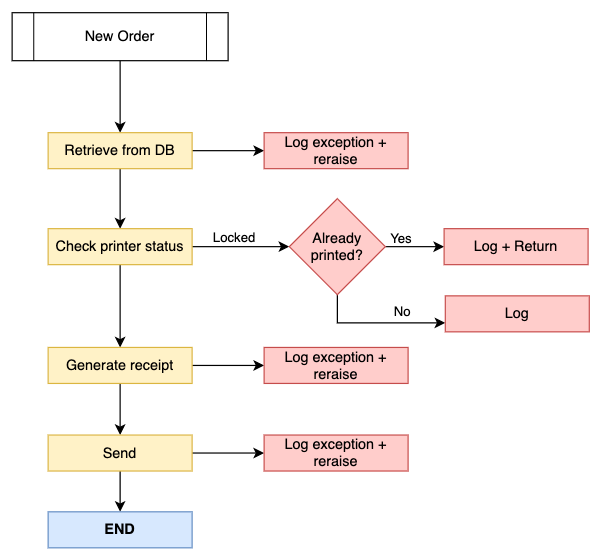Handling exceptions in Python like a PRO 🐍 💣
One of the downsides of a flexible language like python is that people often assume that as long as something works then it's probably the proper way of doing so. I would like to write this humble guide on how to effectively use python exceptions and how to handle exceptions and log them correctly.
Handling exceptions effectively
Intro
Let's consider the following system, a microservice responsible for:
- Listening to new order events;
- Retrieving the order from the database
- Checking printer status;
- Printing the receipt;
- Sending receipts to the Internal Revenue System (IRS);

Anything can break at any moment. You might have trouble with the order object missing important information, or maybe your printer is out of paper, maybe the IRS is out of service and you can't sync the receipt with them, or maybe, who knows, your database is unavailable at the moment.
You must respond to any situation properly and proactively to mitigate errors when handling new orders.
And this is the actual kind of code (which althought works, it's bad and ineffective) that I see people writing:
class OrderService:
def emit(self, order_id: str) -> dict:
try:
order_status = status_service.get_order_status(order_id)
except Exception as e:
logger.exception(
f"Order {order_id} was not found in db "
f"to emit. Error: {e}."
)
raise e
(
is_order_locked_in_emission,
seconds_in_emission,
) = status_service.is_order_locked_in_emission(order_id)
if is_order_locked_in_emission:
logger.info(
"Redoing emission because "
"it was locked in that state after a long time! "
f"Time spent in that state: {seconds_in_emission} seconds "
f"Order: {order_id}, "
f"order_status: {order_status.value}"
)
elif order_status == OrderStatus.EMISSION_IN_PROGRESS:
logger.info("Aborting emission request because it is already in progress!")
return {"order_id": order_id, "order_status": order_status.value}
elif order_status == OrderStatus.EMISSION_SUCCESSFUL:
logger.info(
"Aborting emission because it already happened! "
f"Order: {order_id}, "
f"order_status: {order_status.value}"
)
return {"order_id": order_id, "order_status": order_status.value}
try:
receipt_note = receipt_service.create(order_id)
except Exception as e:
logger.exception(
"Error found during emission! "
f"Order: {order_id}, "
f"exception: {e}"
)
raise e
try:
broker.emit_receipt_note(receipt_note)
except Exception as e:
logger.exception(
"Emission failed! "
f"Order: {order_id}, "
f"exception: {e}"
)
raise e
order_status = status_service.get_order_status(order_id)
return {"order_id": order_id, "order_status": order_status.value}
I'll focus first on OrderService excessive knowledge which makes him somewhat a Blob and later on I will explore proper reraising + proper exception logging.
Why is this service a blob
This service knows too much. Some people may argue that this service only knows about what it should know (i.e. all steps related to receipt generation), but it knows way more than that.
It focuses on producing errors (e.g. database, printing, order status) instead of what it does (e.g. retrieve, check status, generate, send) and how to respond in case of failures.
In that sense, it makes me feel that the client is teaching the serving class what exceptions it might produce. If we decide to reuse it in any other step (let's say a customer wants another printed copy from an older order receipt), we would be replicating most of this code.
Although this service works fine, it's hard to maintain, and it's not clear how one step correlates to the other due to the repeated except blocks between every step which take away our attention on the "how" to think about "when".
1️⃣ First improvement: Make exceptions specific
Let's make the exceptions more accurate and specific first. The benefits can't be seen right away, so I'll not spend too much time explaining it right now. But please, pay attention as the code evolves.
I will only highlight what we modified:
try:
order_status = status_service.get_order_status(order_id)
except Exception as e:
logger.exception(...)
raise OrderNotFound(order_id) from e
...
try:
...
except Exception as e:
logger.exception(...)
raise ReceiptGenerationFailed(order_id) from e
try:
broker.emit_receipt_note(receipt_note)
except Exception as e:
logger.exception(...)
raise ReceiptEmissionFailed(order_id) from e
Note that this time I'm also benefiting from using from e which is the correct way of raising an exception from another and keeps the full stack trace.
2️⃣ Second improvement: Mind your own business
Now that we have custom exceptions, we can move on to "don't teach classes what can go wrong" - they will report to us if it happens!
# Services
class StatusService:
def get_order_status(order_id):
try:
...
except Exception as e:
raise OrderNotFound(order_id) from e
class ReceiptService:
def create(order_id):
try:
...
except Exception as e:
raise ReceiptGenerationFailed(order_id) from e
class Broker:
def emit_receipt_note(receipt_note):
try:
...
except Exception as e:
raise ReceiptEmissionFailed(order_id) from e
# Main class
class OrderService:
def emit(self, order_id: str) -> dict:
try:
order_status = status_service.get_order_status(order_id)
(
is_order_locked_in_emission,
seconds_in_emission,
) = status_service.is_order_locked_in_emission(order_id)
if is_order_locked_in_emission:
logger.info(
"Redoing emission because "
"it was locked in that state after a long time! "
f"Time spent in that state: {seconds_in_emission} seconds "
f"Order: {order_id}, "
f"order_status: {order_status.value}"
)
elif order_status == OrderStatus.EMISSION_IN_PROGRESS:
logger.info("Aborting emission request because it is already in progress!")
return {"order_id": order_id, "order_status": order_status.value}
elif order_status == OrderStatus.EMISSION_SUCCESSFUL:
logger.info(
"Aborting emission because it already happened! "
f"Order: {order_id}, "
f"order_status: {order_status.value}"
)
return {"order_id": order_id, "order_status": order_status.value}
receipt_note = receipt_service.create(order_id)
broker.emit_receipt_note(receipt_note)
order_status = status_service.get_order_status(order_id)
except OrderNotFound as e:
logger.exception(
f"Order {order_id} was not found in db "
f"to emit. Error: {e}."
)
raise
except ReceiptGenerationFailed as e:
logger.exception(
"Error found during emission! "
f"Order: {order_id}, "
f"exception: {e}"
)
raise
except ReceiptEmissionFailed as e:
logger.exception(
"Emission failed! "
f"Order: {order_id}, "
f"exception: {e}"
)
raise
else:
return {"order_id": order_id, "order_status": order_status.value}
How does it feel? Much better, right? You have a single try block where you can logically follow to understand what happens next, you have grouped specific except blocks that help you understand the "when" situations and edge cases, and lastly you have an else block outlining what would happen if everything is successful.
Also, please note that I kept the "reraise" statements raise without redeclaring the exception object. It's not a typo. Actually, that's the correct way of reraising the current exception: Simple, not verbose.
I'm still not happy though. These logs are annoying me.
3️⃣ Third improvement: Better logging
This step reminds me of the Tell Don't Ask principle although it's not quite the same. Instead of me asking exception details to provide a meaningful message, they should do it themselves - after all, they're already specific!
### Exceptions
class OrderCreationException(Exception):
pass
class OrderNotFound(OrderCreationException):
def __init__(self, order_id):
self.order_id = order_id
super().__init__(
f"Order {order_id} was not found in db "
"to emit."
)
class ReceiptGenerationFailed(OrderCreationException):
def __init__(self, order_id):
self.order_id = order_id
super().__init__(
"Error found during emission! "
f"Order: {order_id}"
)
class ReceiptEmissionFailed(OrderCreationException):
def __init__(self, order_id):
self.order_id = order_id
super().__init__(
"Emission failed! "
f"Order: {order_id} "
)
### Main class
class OrderService:
def emit(self, order_id: str) -> dict:
try:
...
except OrderNotFound:
logger.exception("We got a database exception")
raise
except ReceiptGenerationFailed:
logger.exception("We got a problem generating the receipt")
raise
except ReceiptEmissionFailed:
logger.exception("Unable to emit the receipt")
raise
else:
return {"order_id": order_id, "order_status": order_status.value}
Oh, my eyes finally feel some relief. Less repetition for God's sake! Note the recommended way of logging exceptions is exactly as I'm showing above: logger.exception("ANY MESSAGE"). You don't even need to pass down the exception because it's already implicit. Furthermore, the custom message we defined inside each exception with the order_id will be displayed in the logs - so you don't repeat yourself and you don't manipulate your inner exception data.
Here's an output sample of how your logs would look like:
❯ python3 testme.py
Unable to emit the receipt # <<-- My log message
Traceback (most recent call last):
File "/path/testme.py", line 19, in <module>
tryme()
File "/path/testme.py", line 14, in tryme
raise ReceiptEmissionFailed(order_id)
ReceiptEmissionFailed: Emission failed! Order: 10 # <<-- My exception message
Now, whenever I raise this exception, the message is already set and clear and I don't need to remind myself of logging the order_id that generated it.
4️⃣ Final improvement: Simplify it
After paying closer attention to our final code, it seems better, easy to read and maintain.
But... Is this OrderService managing business logic? I don't think it's a service? It seems more like coordinating calls to actual business logic services which fits better as a facade pattern.
Besides this, we can notice it asking to status_service for data to do something with it. (Which, this time, indeed breaks the idea of Tell Don't Ask).
Let's move on to simplifying.
class OrderFacade: # Renamed to match what it actually is
def emit(self, order_id: str) -> dict:
try:
# NOTE: info logging still happens inside
status_service.ensure_order_unlocked(order_id)
receipt_note = receipt_service.create(order_id)
broker.emit_receipt_note(receipt_note)
order_status = status_service.get_order_status(order_id)
except OrderAlreadyInProgress as e:
# New block
logger.info("Aborting emission request because it is already in progress!")
return {"order_id": order_id, "order_status": e.order_status.value}
except OrderAlreadyEmitted as e:
# New block
logger.info(f"Aborting emission because it already happened! {e}")
return {"order_id": order_id, "order_status": e.order_status.value}
except OrderNotFound:
logger.exception("We got a database exception")
raise
except ReceiptGenerationFailed:
logger.exception("We got a problem generating the receipt")
raise
except ReceiptEmissionFailed:
logger.exception("Unable to emit the receipt")
raise
else:
return {"order_id": order_id, "order_status": order_status.value}
We just created a new ensure_order_unlocked method to our status_service which now is responsible for throwing exceptions/logging in case something is not right.
Ok, tell me. How easier to read is it now?
I can understand all possible returns within quick eyesight. I know what happens when everything goes well and how edge cases may produce different outcomes. All of that without scrolling back and forth.
That's just simple as (mostly) every code should be.
Note that I decided to print exception object e in the logging since it would internally run str(e) which then returns the exception message. I felt it would be helpful to be verbose since we're not using log.exception for that block, thus the exception message wouldn't show up.
Now, let's break down the tricks to make your code always clear to read and easy to maintain.
💣 Creating exceptions effectively
Always categorize your exceptions with a base one, and extend all specific exceptions from that one. It's helpful and you might reuse logic for related code.
Exceptions are objects that carry information with them, feel free to add custom attributes that might help you understand what's going on. Don't let your business code teach exceptions how it should be built, it's hard to lose yourself with so many messages and details.
# Base category exception
class OrderCreationException(Exception):
pass
# Specific error with custom message. Order id is required.
class OrderNotFound(OrderCreationException):
def __init__(self, order_id):
self.order_id = order_id # custom property
super().__init__(
f"Order {order_id} was not found in db "
f"to emit."
)
# Specific error with custom message. Order id is required.
class ReceiptGenerationFailed(OrderCreationException):
def __init__(self, order_id):
self.order_id = order_id # custom property
super().__init__(
"Error found during emission! "
f"Order: {order_id}"
)
For the sample above I could go beyond and extend the base class to always receive an order_id if I wish. This tip helps to keep the code DRY because I don't have to be verbose when I create the exception. The usage just requires 1 var and that's it.
def func1(order_id):
raise OrderNotFound(order_id)
# instead of raise OrderNotFound(f"Can't find order {order_id}")
def func2(order_id):
raise OrderNotFound(order_id)
# instead of raise OrderNotFound(f"Can't find order {order_id}")
Testing it also makes more sense, since I can assert the order_id over a string.
assert e.order_id == order_id
# instead of assert order_id in str(e)
🧤 Catching and raising exceptions effectively
Another thing that people often end up doing wrong is catching and reraising.
According to Python's PEP 3134, this is how you should be:
Raising the same exception
The bare raise statement is more than fine.
try:
...
except CustomException as ex:
# do stuff (e.g. logging)
raise
Raising from another exception
This one is particularly relevant since it keeps the whole stack trace and helps your team debugging root causes.
try:
...
except CustomException as ex:
raise MyNewException() from ex
📝 Logging exceptions effectively
Another piece of advice that will prevent you from being extremely verbose:
Use logger.exception
You don't have to log the exception object. The exception function of the logger is intended to be used as-is inside except blocks. It already handles the stack trace with execution info and displays which exception caused it with its message set to ERROR level!
try:
...
except CustomException:
logger.exception("custom message")
What if it's not an error?
If for any reason you don't want to log an exception as error, maybe it's a warning or even info as you saw above.
Then you might decide to set exc_info to True if you wish to keep the stack trace. Furthermore, it would be fine to use the exception object inside the message.
If you want to keep improving on writing effective Python code, I recommend this book (I'm not the author). Buying the book through this link helps me keep writing 😄.
I used part of my weekend to write on how #python exceptions should be created and handledhttps://t.co/m7zZ96m8E4
— Gui Latrova (@guilatrova) May 19, 2021
I'm open to critics. Let me know if it sucks!
References
Python Docs
Principles and Code Quality

